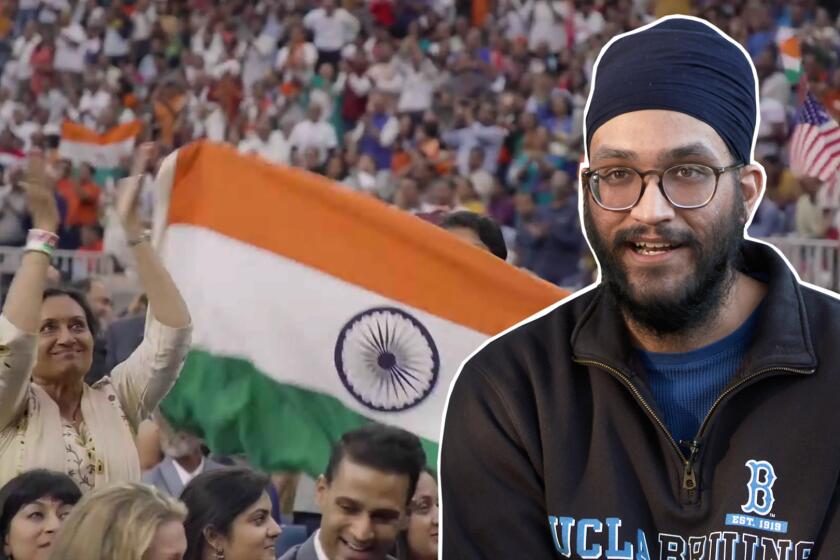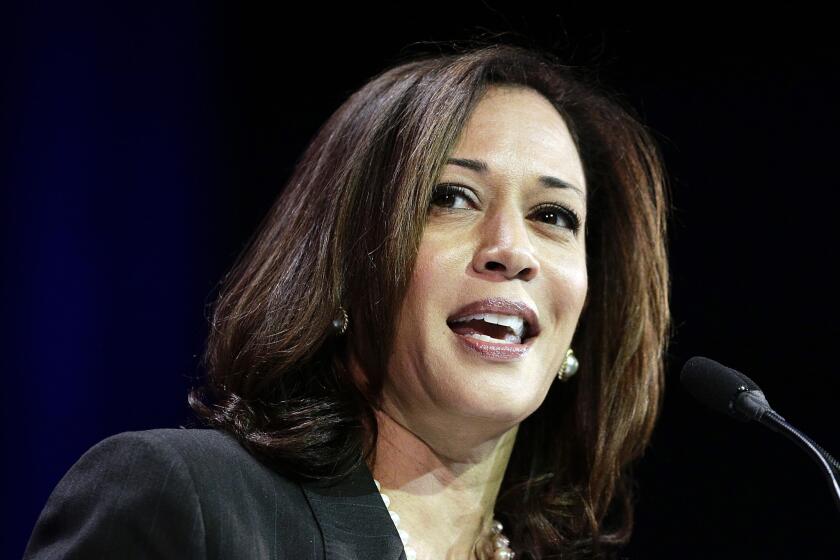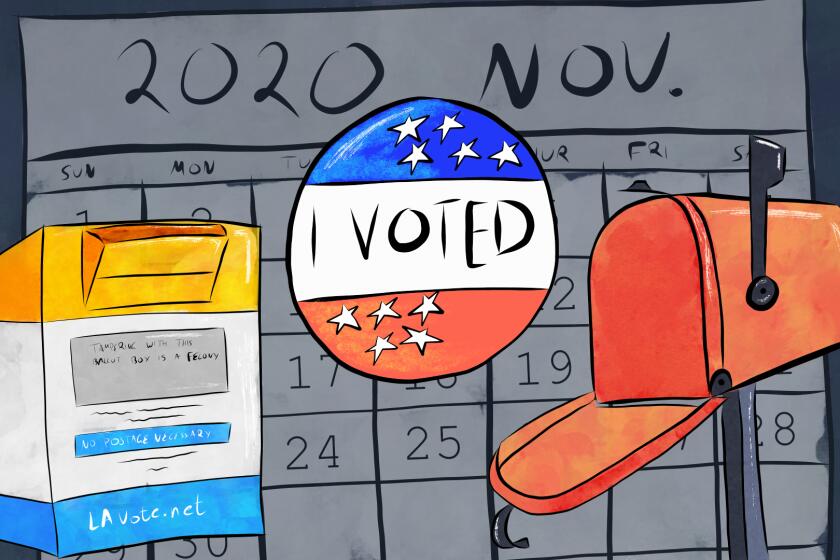When a Senate colleague mocked Kamala Harris’ name, so many people winced with recognition
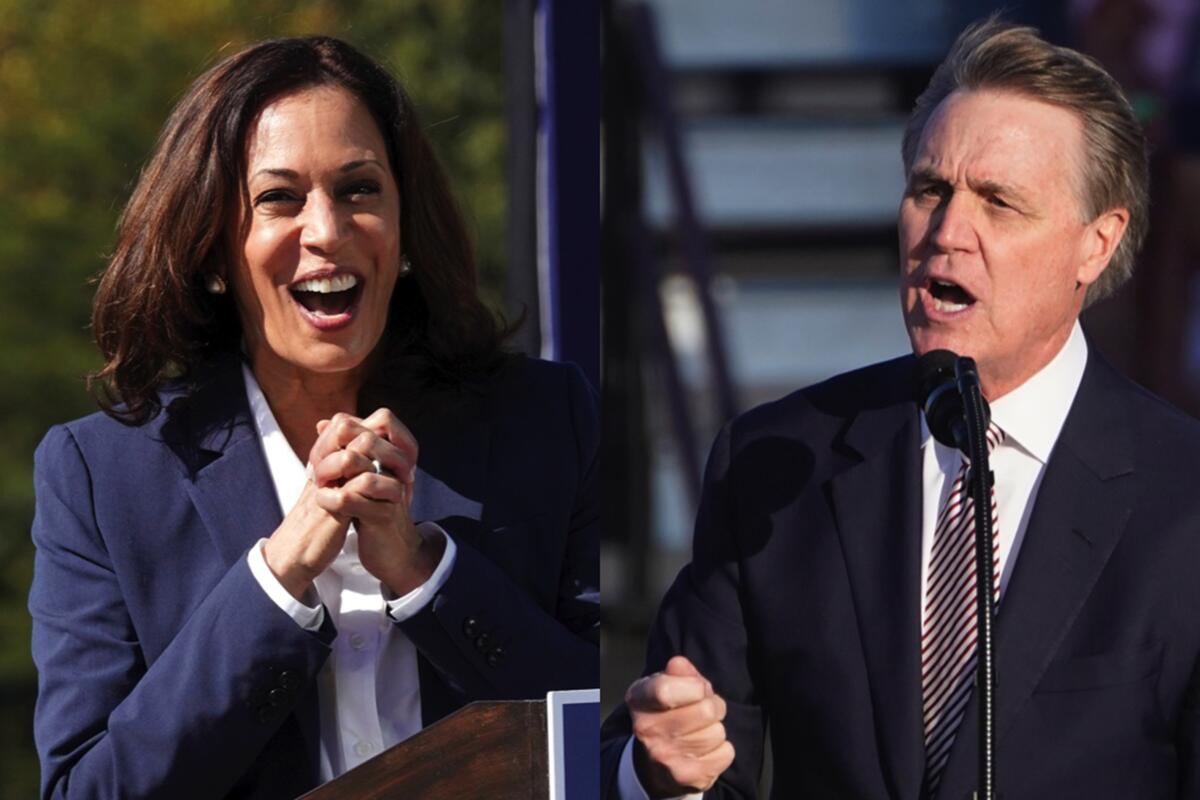
- Share via
When Georgia Sen. David Perdue served as the opening act for President Trump at a recent rally, he turned his attention to Democratic vice presidential nominee Kamala Harris, his colleague of three years in the Senate.
Or as Perdue referred to her: “KAH’-mah-lah? Kah-MAH’-lah? Kamala-mala-mala? I don’t know. Whatever.”
The crowd roared with laughter.
My stomach dropped.
Instantly reminded of being made fun of for my own name in school — and to this day finding it impossible to get my name spelled properly on my Starbucks latte — I sent out what I thought was an innocuous tweet about growing up with a “weird” name. (For the record, it’s SEE-mah MAY-tah, though pronunciation wasn’t the issue when I was a tween.)
Hundreds of people responded, many recounting their own experiences with unusual names in school and in the workforce.
“It built a nice core of anger that erupts when I see stuff like this and makes me see red,” wrote Irvine resident Dan Chiappe, 53. The Peruvian native’s birth name is Danilo Chiappe, pronounced Dah-KNEE-low Kee-YAHP-eh.
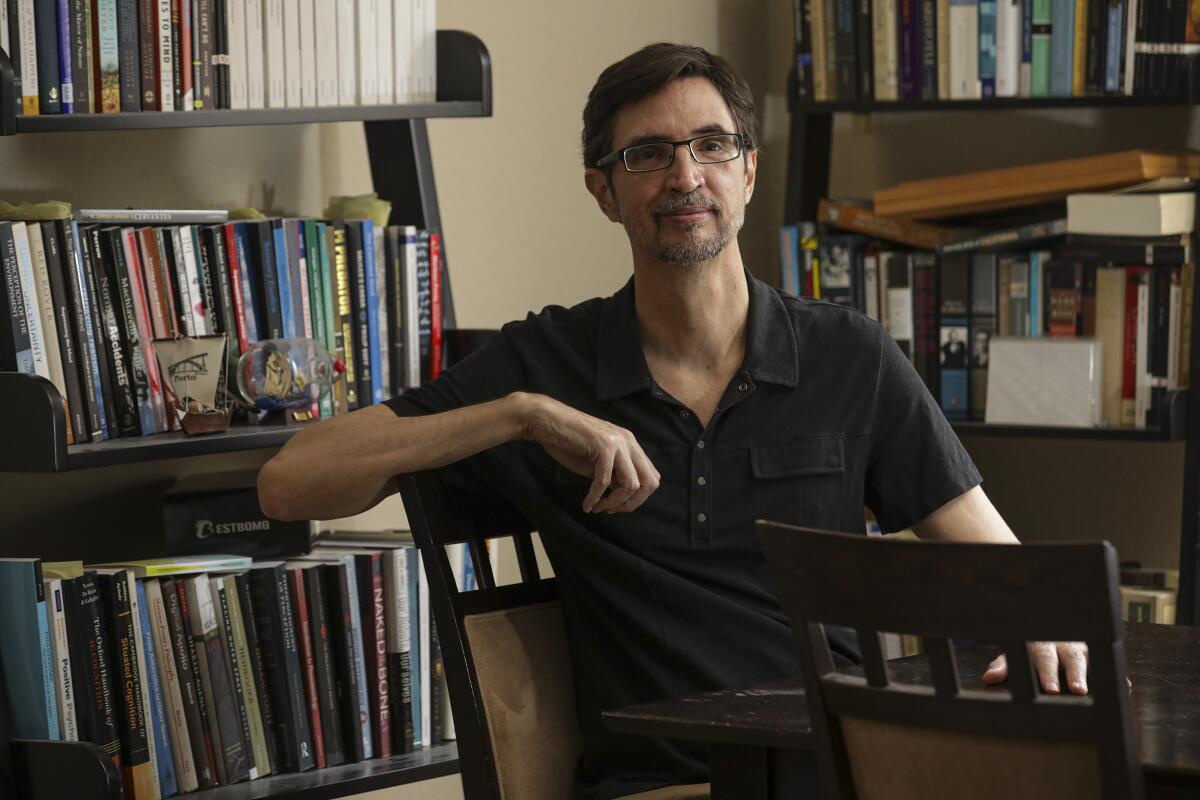
In an interview, he recalled a fourth-grade teacher at his Toronto school calling him “Chappy Wappy” in front of other students, who joined in and laughed. Schoolyard fistfights ensued. By high school, he’d shortened his first name to Dan.
“It’s not just a word. It’s your name. Your name is an intrinsic part of your identity. So when other kids and authority figures ridicule your name, it means you are an outsider,” said Chiappe, now a psychology professor at Cal State Long Beach. “And I have always retained that feeling of being an outsider.”
That’s the entire point, particularly of purposeful mispronunciation or mocking — to paint someone as different, as foreign, as “the other,” said Rita Kohli, an associate professor in the Education, Society, and Culture program at UC Riverside.
“I had a pretty visceral reaction” to seeing Perdue butcher Harris’ name, Kohli said.
The Trump and Biden campaigns have repeatedly focused on Indian Americans, a group with growing political and fundraising clout.
Perdue’s campaign said the Republican senator “simply mispronounced” Harris’ name, and he said he meant “no disrespect” to the vice presidential nominee, who is the first Black woman and Indian American woman to appear on a major party’s ticket.
But for many, including Kohli, the explanation strained credibility because the pair had been colleagues for years and served together on the Senate’s budget committee. (As Harris has frequently explained, her first name is pronounced “comma-la.” It means lotus flower in Sanskrit.)
“He knows her name,” Kohli said. “It was just such a blatant disregard. It was like he was de-professionalizing her, making her the butt of a joke — blatant disrespect, relying on power, racializing and othering.”
Kohli noted that the United States has a long history of forcibly changing the names of the less powerful to names that reflected Anglo-Saxon, Protestant norms, whether it was enslaved Africans who were brought here and renamed by their oppressors, or Latino and indigenous children renamed in government schools.
Kohli has studied the impact of children’s names being mispronounced in school.
“We found that they started to buy into the cultural hierarchy. They started to feel shame about their names, about their culture, and kind of separating themselves from their language, their families,” she said. “They would feel anxiety about being in class, contributing in class.”
Democratic Sen. Kamala Harris is the first woman of color on a major presidential ticket. Americans of color have been celebrating, analyzing and critiquing her elevation.
Maritza Chott, nee Maritza Robles Norzagaray (mahr-REE-tsah RO-bles NOR-za-ga-rrye), waited with dread for roll call on the first day of school every year in Yakima, Wash.
“My teachers would get to my name and stare. Typically, I’d raise my hand and say, ‘I’m here, I’m here’ to not even let them fumble around,” said Chott, the daughter of Mexican immigrants who picked apples in the nearby orchards. “Some of them tried and some of the kids in class would giggle. I just always felt like an other in a class full of Jessicas and Kristens.”
After Chott’s family moved to the suburbs, into a less diverse school district, classmates called her Marissa.
“I would say, ‘Yeah, yeah, it’s Marissa.’ I never corrected people,” said Chott, 50. “I am embarrassed for myself.”
Chott studied women’s and Latino studies at the University of Washington, and increasingly embraced her roots — and her name. But when she entered the workforce, she used an Anglicized pronunciation for more than two decades. When she was 46, a boss heard her pronounce her name differently — with a rolling R and a Spanish accent — than she typically did in the office, and asked why.
Chott responded that it was just easier to go with the Anglicized pronunciation.
“She said, ‘So what — that’s our problem, not yours,’” before asking how her mother pronounced her name. Chott burst into tears.
“It just hit me — even though I had gone through college, I had done the learning and got back to my roots, I was still trying to simplify my name and make it easier for other people and not owning it. I cried.”
The story frequently comes up in discussions with Chott’s two children. “I want my kids to understand their Latino roots and feel empowered by them,” she said. “Now they see when I answer the phone, when I’m talking to people, I’m very cognizant; I’m saying my name the way my mom says it.”
With P.V. Gopalan, an upright civil servant and doting patriarch, Kamala Harris forged one of the defining relationships of her life.
Name mangling and mocking is a time-worn tradition in politics. When President Barack Obama was a relative unknown, he used to preemptively introduce himself as “a skinny kid with a funny name.” Some conservatives, including President Trump as recently as Sunday, still emphasize his middle name, Hussein.
Virginia lawmaker Danica Roem, the first openly transgender person elected to a state Legislature, had said her rivals highlighted her middle name of Anthony — a family name — as a “dog whistle.”
Trump, as conservative politicians and commentators have done repeatedly, made a point of mispronouncing Harris’ name yet again on Friday at a Florida campaign rally.
“By the way, Ka-MAHH-lahh will not be your first female president,” he said, stretching out the second and third syllables like a taunt, to the crowd of jeering retirees.
The name issue isn’t new for Harris. During her 2016 Senate campaign, she released a television ad that featured young children demonstrating the proper and improper pronunciation of her name. In the current campaign, her supporters wear T-shirts that offer a guide: a comma, and the syllable “la.”
After Perdue mocked Harris’ name, incensed Democrats contributed $2 million to the Georgian’s Senate race rival, Jon Ossoff. Harris’ campaign declined to make the vice presidential nominee available for comment. But her husband, Doug Emhoff, responded to Perdue while campaigning in Atlanta two days after the senator butchered Harris’ name.
“Let me help what’s-his-face pronounce this: M-V-P,” Emhoff said. “If he can’t remember her name, how about Madam Vice President?”
The flap also prompted #MyNameIs to trend on Twitter, where politicians, celebrities, athletes and immigrants and Americans from all walks of life described the origins of their name.
Nandhini Nallamotu, 19, found the Twitter effort “empowering.” She said her name was mispronounced as Nan-dee-nee in grade school in northern Virginia, and she never corrected teachers or her classmates because she didn’t want to make waves.
“I didn’t even pronounce my name correctly,” said Nallamotu, now a sophomore at William and Mary College.
After she graduated from high school, she saw a clip of comedian Hasan Minhaj questioning how Americans could learn to pronounce Arnold Schwarzenegger or “Game of Thrones” character Daenerys Targaryen but couldn’t pronounce ethnic names. It struck a chord, so Nallamotu decided that she would insist people pronounce her name properly when she started college.
Covering Kamala Harris
It didn’t go well initially. “I’m never going to remember that,” some of her classmates flatly responded. Nallamotu ultimately decided that those who took the time to learn her name were the type of people she wanted in her life.
On a Zoom call the first day of an internship with a government contractor this summer, a co-worker grossly mispronounced her name. Nallamotu responded with a polite email explaining how to phonetically pronounce her name — Nun-thi-NEE. She received a swift apology, and her name was said properly the rest of the summer.
“It comes down to respect and appreciation for diversity,” Nallamotu said. “I want to embody that. I want the people in my life or the people I come across to respect me for exactly who I am.”
More to Read
Get the L.A. Times Politics newsletter
Deeply reported insights into legislation, politics and policy from Sacramento, Washington and beyond. In your inbox three times per week.
You may occasionally receive promotional content from the Los Angeles Times.

